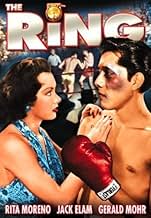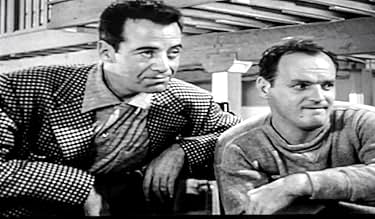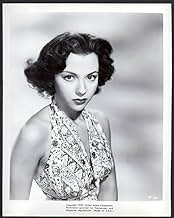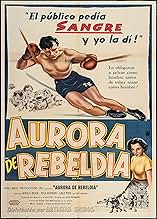Aggiungi una trama nella tua linguaA young American of Mexican decent in East Los Angeles, California uses the boxing ring to make a better life for himself and his family, and learns as much about being a Latino in a white s... Leggi tuttoA young American of Mexican decent in East Los Angeles, California uses the boxing ring to make a better life for himself and his family, and learns as much about being a Latino in a white society as he does about boxing.A young American of Mexican decent in East Los Angeles, California uses the boxing ring to make a better life for himself and his family, and learns as much about being a Latino in a white society as he does about boxing.
Recensioni in evidenza
"This is Los Angeles: sprawling metropolis of the west. It's a beautiful city. It walks like a young giant from the mountains down to the sea. It has shiny buildings and modern freeways. Almost engulfed by the city surrounding it lies a little street "Olvera street." A street that appears to be forgotten by time."
Thus starts the movie with tourists taking pictures of "the lazy Mexicans."
A Mexican family falls on hard times when the father is laid off. Bad timing, it turns out. The family had just bought new furniture and are very proud of the blue sofa and matching chairs (the film is b&w so the chairs look grey to us). "Send it back!" demands the father. The son says he will get a job to help pay for the furniture but the father says "you are only a boy." Storming out of the house the son goes to "the clubhouse" to see his friends. Harassed by bigoted white police and denied service by white owned businesses "Tommy" lets his rage out and gets in a fight.
Tommy is seen fighting by a talent scout - one who is interested in making Tommy a professional fighter. "Don't you want to be something? Do you want to be pushed around like your dad?" Tommy is convinced and "Tommy Kansas" is born.
Tommy's father thinks it's a disgrace. "I am a poor man, but I am not a brute!" But the rest of the family is behind him. "If you do not give up fighting you will leave this house!" exclaims his father as he storms off.
I will admit to not being a big boxing fan. This film, however, kept my interest. The main character "Tommy" is well played and his transformation from naive street kid to young seasoned boxer makes this film worthwhile.
Thus starts the movie with tourists taking pictures of "the lazy Mexicans."
A Mexican family falls on hard times when the father is laid off. Bad timing, it turns out. The family had just bought new furniture and are very proud of the blue sofa and matching chairs (the film is b&w so the chairs look grey to us). "Send it back!" demands the father. The son says he will get a job to help pay for the furniture but the father says "you are only a boy." Storming out of the house the son goes to "the clubhouse" to see his friends. Harassed by bigoted white police and denied service by white owned businesses "Tommy" lets his rage out and gets in a fight.
Tommy is seen fighting by a talent scout - one who is interested in making Tommy a professional fighter. "Don't you want to be something? Do you want to be pushed around like your dad?" Tommy is convinced and "Tommy Kansas" is born.
Tommy's father thinks it's a disgrace. "I am a poor man, but I am not a brute!" But the rest of the family is behind him. "If you do not give up fighting you will leave this house!" exclaims his father as he storms off.
I will admit to not being a big boxing fan. This film, however, kept my interest. The main character "Tommy" is well played and his transformation from naive street kid to young seasoned boxer makes this film worthwhile.
Lalo Rios is Tommy, a young boy who turns to boxing to help out his struggling family in early 1950's Los Angeles. He learns about a lot more than just how to fight in this 80 minute art house type drama, including about how his values don't always mix with the values of those trying to get him ahead in the business. Rios is outstanding, and it is surprising considering he never became a bigger star. The only name actor in this film is Academy Award Winning Rita Moreno as his sweet girlfriend. Then just starting out her career with a few appearances in MGM musicals ("The Toast of New Orleans" & "Pagan Love Song") to name a few, the future "Anita" of "West Side Story's" film version is one of the few good people in Tommy's life who cares for him, not for his success as a boxer.
The scene where Tommy and his pals go into a restraunt in Beverly Hills after a boxing match Tommy looses is quite revealing about attitudes towards Latinos (and probably other minorities) during the early 1950's. The waitress reluctantly places glasses of water (spilling most of it) at their table, then calls the police, prepared for trouble. She then goes about her business, ignoring them, and waiting on the white customers at the tables around them. When the policeman arrives, he seems suspicious at first, but then is actually sympathetic when he realizes that the boys are not up to no good, just misunderstood. It is a remarkable scene, not played for any type of shock value, but just to make the audience aware of how little prejudices can lead to bigger ones, and ultimately, cause the types of race and gang wars seen in the newspapers every day.
There are also some touching understated moments where Tommy's younger brother begins to show idol worship, and Tommy begins to realize how his ambitions are affecting the future of his younger brother. This leads to the final scene where Tommy confronts all of these demons. The final is very powerful, leading to an ending which some might consider "incomplete", but it actually does reflect reality, ending one chapter in his life, and moving onto wherever his life happens to take him.
While not a fan of boxing movies, I found "The Ring" to be engrossing because of the sympathetic way it presented the young hero, not type casting. A bit at the beginning where Tommy's father, ailing at work, is called a lazy Mexican by two American tourists, is very revealing too about the way many white people then (and even today) look at people of different cultures. Anyone who sees this film will find the scene disturbing, and may see the prejudices in themselves that they have always tried to keep hidden. For a small and simple film, "The Ring" says a lot, and achieves more than some of the bigger films released at the same time.
The scene where Tommy and his pals go into a restraunt in Beverly Hills after a boxing match Tommy looses is quite revealing about attitudes towards Latinos (and probably other minorities) during the early 1950's. The waitress reluctantly places glasses of water (spilling most of it) at their table, then calls the police, prepared for trouble. She then goes about her business, ignoring them, and waiting on the white customers at the tables around them. When the policeman arrives, he seems suspicious at first, but then is actually sympathetic when he realizes that the boys are not up to no good, just misunderstood. It is a remarkable scene, not played for any type of shock value, but just to make the audience aware of how little prejudices can lead to bigger ones, and ultimately, cause the types of race and gang wars seen in the newspapers every day.
There are also some touching understated moments where Tommy's younger brother begins to show idol worship, and Tommy begins to realize how his ambitions are affecting the future of his younger brother. This leads to the final scene where Tommy confronts all of these demons. The final is very powerful, leading to an ending which some might consider "incomplete", but it actually does reflect reality, ending one chapter in his life, and moving onto wherever his life happens to take him.
While not a fan of boxing movies, I found "The Ring" to be engrossing because of the sympathetic way it presented the young hero, not type casting. A bit at the beginning where Tommy's father, ailing at work, is called a lazy Mexican by two American tourists, is very revealing too about the way many white people then (and even today) look at people of different cultures. Anyone who sees this film will find the scene disturbing, and may see the prejudices in themselves that they have always tried to keep hidden. For a small and simple film, "The Ring" says a lot, and achieves more than some of the bigger films released at the same time.
Outstanding overlooked boxing film with an outstanding cast of B actors. Lalo Rios stands out and it seems his fictional boxing career mirrored his real life acting career, in that he showed alot of potential, but for some unexplained reason, never became successful. Filmed on location in early 1950s California in glorious black and white. Very realistic and unromantizied look at boxing and ethnic discrimination. Honestly, I think this film is better then Raging Bull.
A young Rita Moreno playing the sweet girl next door,Jack Elam in a tweed sport coat and floppy hat as a sleazy boxing promoter...Wow,I can't ask for much more.Movie was made when I was a youngster,watching it now it looks so nostalgic almost like being in a dream for me.Many scenes look to be shot on location and remind me of my own slum.Shiny old cars,carhops,old houses,etc are just icing on the cake.The story?Young Chicano trying to bust out of poverty by being a boxer also facing discrimination which was more blatant back then.All the cast gives realistic presentations...Some things don't change with time,like an angry young man being calmed down by the soft words of his girl(Rita)...Although crazy about boxing I don't like boxing movies which this is,part of the reason I didn't give it a 10.
Vidal Cantanios struggles to find honorable work in East Los Angeles. He's been laid off by the Anglo boss. Rebellious son Tomas 'Tommy' Cantanios gets into a street fight with a couple of racists and gets picked up by boxing promoter Pete Ganusa. He starts prize fighting despite his father's disapproval. Lucy Gomez (Rita Moreno) is his girlfriend.
It's an early film examining institutional racism with a boxing film. It's a little jarring to see overt racism against Mexicans done so plainly. The lead's acting is rather amateurish. He does act opposite future star Rita Moreno. This is one of her first non-dancing acting jobs in a non-racist role. Overall, this is an important indie for the themes of racism and lower class struggles. The lead's poor acting does hold this back. If only, they had somebody real.
It's an early film examining institutional racism with a boxing film. It's a little jarring to see overt racism against Mexicans done so plainly. The lead's acting is rather amateurish. He does act opposite future star Rita Moreno. This is one of her first non-dancing acting jobs in a non-racist role. Overall, this is an important indie for the themes of racism and lower class struggles. The lead's poor acting does hold this back. If only, they had somebody real.
Lo sapevi?
- QuizRobert Altuna received an "Introducing" credit.
- BlooperBefore the final boxing match; real film footage of Art Aragon is clipped into the fight. His three corner men in the real footage are clearly completely different from the actors playing his corner men in the movie.
- ConnessioniReferenced in Crisis in Morality (1962)
I più visti
Accedi per valutare e creare un elenco di titoli salvati per ottenere consigli personalizzati
Dettagli
- Data di uscita
- Paese di origine
- Lingue
- Celebre anche come
- Pachuco
- Luoghi delle riprese
- Azienda produttrice
- Vedi altri crediti dell’azienda su IMDbPro
- Tempo di esecuzione
- 1h 19min(79 min)
- Colore
- Proporzioni
- 1.37 : 1
Contribuisci a questa pagina
Suggerisci una modifica o aggiungi i contenuti mancanti














